英语中的主格宾格所有格-讲解与练习PPT课件
合集下载
英语主格宾格所有格课件ppt
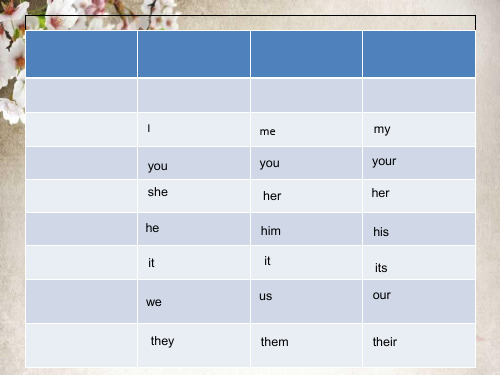
所有格相当于形容词,后 面接名词: This is my book.
名词形式的所有格=所有格+名词
比如:my book=mine(当然, 前面要有提及,要不你说Mine 别人不知道你说的具体是什么 东西)
经营者提供商品或者服务有欺诈行为 的,应 当按照 消费者 的要求 增加赔 偿其受 到的损 失,增 加赔偿 的金额 为消费 者购买 商品的 价款或 接受服 务的费 用
I am a girl. Are you student here? She is a nurse. He is a doctor. It is a dog. We are students
They are apples.
经营者提供商品或者服务有欺诈行为 的,应 当按照 消费者 的要求 增加赔 偿其受 到的损 失,增 加赔偿 的金额 为消费 者购买 商品的 价款或 接受服 务的费 用
人物对话
A: I am a girl. B:Don't you boy? A:No, I don't.
经营者提供商品或者服务有欺诈行为 的,应 当按照 消费者 的要求 增加赔 偿其受 到的损 失,增 加赔偿 的金额 为消费 者购买 商品的 价款或 接受服 务的费 用
经营者提供商品或者服务有欺诈行为 的,应 当按照 消费者 的要求 增加赔 偿其受 到的损 失,增 加赔偿 的金额 为消费 者购买 商品的 价款或 接受服 务的费 用
宾格用作宾语,在动词或者介 词后: 动词后:This is me.
介词后:Go without me.
经营者提供商品或者服务有欺诈行为 的,应 当按照 消费者 的要求 增加赔 偿其受 到的损 失,增 加赔偿 的金额 为消费 者购买 商品的 价款或 接受服 务的费 用
名词形式的所有格=所有格+名词
比如:my book=mine(当然, 前面要有提及,要不你说Mine 别人不知道你说的具体是什么 东西)
经营者提供商品或者服务有欺诈行为 的,应 当按照 消费者 的要求 增加赔 偿其受 到的损 失,增 加赔偿 的金额 为消费 者购买 商品的 价款或 接受服 务的费 用
I am a girl. Are you student here? She is a nurse. He is a doctor. It is a dog. We are students
They are apples.
经营者提供商品或者服务有欺诈行为 的,应 当按照 消费者 的要求 增加赔 偿其受 到的损 失,增 加赔偿 的金额 为消费 者购买 商品的 价款或 接受服 务的费 用
人物对话
A: I am a girl. B:Don't you boy? A:No, I don't.
经营者提供商品或者服务有欺诈行为 的,应 当按照 消费者 的要求 增加赔 偿其受 到的损 失,增 加赔偿 的金额 为消费 者购买 商品的 价款或 接受服 务的费 用
经营者提供商品或者服务有欺诈行为 的,应 当按照 消费者 的要求 增加赔 偿其受 到的损 失,增 加赔偿 的金额 为消费 者购买 商品的 价款或 接受服 务的费 用
宾格用作宾语,在动词或者介 词后: 动词后:This is me.
介词后:Go without me.
经营者提供商品或者服务有欺诈行为 的,应 当按照 消费者 的要求 增加赔 偿其受 到的损 失,增 加赔偿 的金额 为消费 者购买 商品的 价款或 接受服 务的费 用
初一人称代词主格和宾格的用法ppt课件
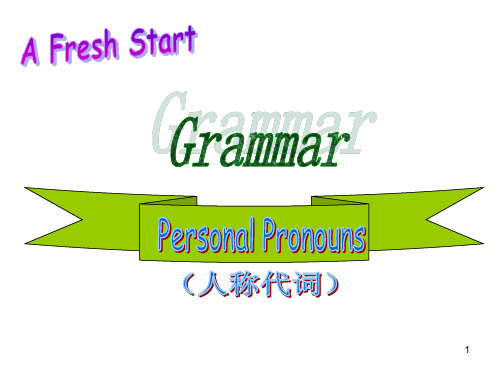
12
3
There are two main sets of personal pronouns : ____s__u_b_j_e_c_t_p_r_o__n_o_u_n__s__(主___格__) ___
and
_____o_b_j_e_c_t_p__ro__n_o_u__n_s_(_宾__格__)_____
4
数
单数
复数
人称 格 主格 宾格 主格 宾格
第一人称 I me we us
第二人称 you you you you
he him 第三人称 she her they them
it it 5
We use a subject pronoun as the subject in a sentence. I t usually comes before a verb.
8
1、单数你他我,复数一二三,道歉我为先.
1.我、你、他、都18岁。Y_o__u_, _h_e_a_n_d__I_a_r_e_1_8_._
2.你们、我们、他们都来自中国。 _W_e_,_y_o_u__a_n_d__th_e_y__a_re__f_ro_m__C__h_in_a___.
2、在简短对话中,当人称代词单独使用或在 not 后多用宾格.
What are the subjects pronouns & verbs in these sentences?
•They live in Shenzhen. • We are all Chinese. • He enjoys swimming.
6
Object pronouns (宾格) We use object pronouns as the Object(宾语) in a sentence. It usually comes after a verb or a preposition(介词).
3
There are two main sets of personal pronouns : ____s__u_b_j_e_c_t_p_r_o__n_o_u_n__s__(主___格__) ___
and
_____o_b_j_e_c_t_p__ro__n_o_u__n_s_(_宾__格__)_____
4
数
单数
复数
人称 格 主格 宾格 主格 宾格
第一人称 I me we us
第二人称 you you you you
he him 第三人称 she her they them
it it 5
We use a subject pronoun as the subject in a sentence. I t usually comes before a verb.
8
1、单数你他我,复数一二三,道歉我为先.
1.我、你、他、都18岁。Y_o__u_, _h_e_a_n_d__I_a_r_e_1_8_._
2.你们、我们、他们都来自中国。 _W_e_,_y_o_u__a_n_d__th_e_y__a_re__f_ro_m__C__h_in_a___.
2、在简短对话中,当人称代词单独使用或在 not 后多用宾格.
What are the subjects pronouns & verbs in these sentences?
•They live in Shenzhen. • We are all Chinese. • He enjoys swimming.
6
Object pronouns (宾格) We use object pronouns as the Object(宾语) in a sentence. It usually comes after a verb or a preposition(介词).
《主格与宾格》课件

2
宾格
宾格常用于不定式的被动语态中,表示动作的接受者。
主格和宾格在复杂句中的应用
主格和宾格在复杂句中的正确使用需要注意句子的结构和意义的表达。
主格
在主语从句和名词性从句中,主格用于作为句子的主语。
宾格
在宾语从句和介词从句中,宾格用于作为句子的宾语。
小结与总结
经过全面的介绍和讲解,希望学生们能够理解主格和宾格的基本概念,准确 地运用在句子中,提升英语写作和口语表达的能力。
《主格与宾格》PPT课件
本课件旨在介绍主格和宾格的基本概念,探讨其在语法上的区别以及在英语 中的特点和应用。通过丰富的例子和练习,帮助学生掌握主格和宾格在不同 语境中的正确使用。
主格和宾格的区分
了解主格和宾格的区别对于构建正确的句子至关重要。主格是句子中的主语,宾格则是句子中的动作的 承受者或接受者。
我、你、他、她、我们、你们、他们、它、 这、那
主格和宾格错误使用的例子
常见的错误使用主格和宾格的情况会造成句子意义的混淆。
错误示范
我给他送礼物。
正确示范
我给她送礼物。
主格和宾格在不定式中的应用
主格和宾格在不定式中起到不同的作用,影响句子结构和意义的表达。
1
主格
主格常用于不定式的主动语态中,表示动作的执行者。
主格和宾格在句子中的位置
主格和宾格在句子中的位置有所不同,关注句子结构可以更好地理解它们的语。
宾格
通常出现在动词或介词之后,作为宾语。
常见的主格和宾格的词汇
了解常见的主格和宾格的词汇可以帮助提高句子的准确性和流畅性。
1 主格
2 宾格
我、你、他、她、我们、你们、他们、这、 那
主格
作为句子的主语,它一般是名词、代词或名词性 短语。
英语主格宾格所有格分类列表PPT课件

's所有格用在人名或者职业后面可以表示处 所 I will go to my uncle's. 我要去我叔叔家。 He is in the doctor's. 他在诊所。
9
双重所有格
of+'s 所有格
He is a friend of Tom's. 他是汤姆的一个朋友。 The man is a brother of my father's. 这个男人是我爸爸的一个兄弟。
4. The apples are on the desk.__________ are very nice.( ) A. They B. Them C. Their D. Theirs
11
6. A friend of will come this evening.
A. Denny's B. Denny C. Dennys'
D. two hours
10. Look at the map. It's .
A. a map of American B. a map of America
C. an American map D. a map to America
12
谢谢聆听
人称代词 第一人称 第二人称
第三人称
数 单数 复数 单数 复数
单数
复数
宾格 me us
you you him her
it them
2) 人称代词有主格和宾格之分。通常主格作主语,宾格作宾语。如: I like table tennis. (作主语) Do you know him?(作宾语)
人称代词有主格和宾格之分。通常主格作主语,宾格作宾语。 如: I like table tennis. (作主语)
9
双重所有格
of+'s 所有格
He is a friend of Tom's. 他是汤姆的一个朋友。 The man is a brother of my father's. 这个男人是我爸爸的一个兄弟。
4. The apples are on the desk.__________ are very nice.( ) A. They B. Them C. Their D. Theirs
11
6. A friend of will come this evening.
A. Denny's B. Denny C. Dennys'
D. two hours
10. Look at the map. It's .
A. a map of American B. a map of America
C. an American map D. a map to America
12
谢谢聆听
人称代词 第一人称 第二人称
第三人称
数 单数 复数 单数 复数
单数
复数
宾格 me us
you you him her
it them
2) 人称代词有主格和宾格之分。通常主格作主语,宾格作宾语。如: I like table tennis. (作主语) Do you know him?(作宾语)
人称代词有主格和宾格之分。通常主格作主语,宾格作宾语。 如: I like table tennis. (作主语)
小学英语人称代词主格和宾格的用法 ppt课件
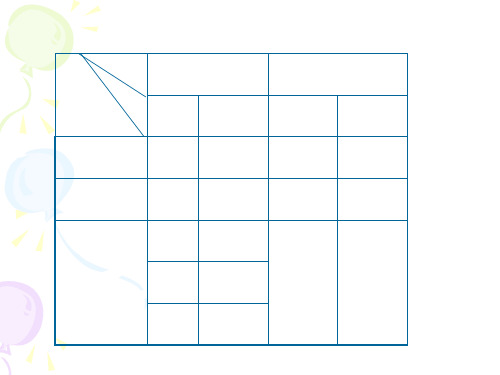
主格人称代词的用法
主格人称代词在句中作 主语。
位置:在陈述句中位于动词前面, 在疑问句中位于be、can、助动词后。
1 I am a teacher. You like music. He is playing football.
2 Does he like sports? What is she doing now? What can we do with a ruler?
名词性物主代词相当于名词,在句中作主语或宾语。
1 This is my book. The book is mine. mine = பைடு நூலகம்y book
2 That is her bike. The bike is hers. hers = her bike
pollyitsname物主代词物主代词第一人称第二人称第三人称第一人称第二人第三人称mymine物主代词物主代词第一人称第二人称第三人称第一人称第二人第三人称我们的你们的他们的myyourhisheritsouryourmineyourshishersitsoursyourstheirs10形容词性形容词性物主代词和物主代词和名词性名词性物主物主代词的用法代词的用法mybook
精品资料
• 你怎么称呼老师?
• 如果老师最后没有总结一节课的重点的难点,你 是否会认为老师的教学方法需要改进?
• 你所经历的课堂,是讲座式还是讨论式? • 教师的教鞭
• “不怕太阳晒,也不怕那风雨狂,只怕先生骂我 笨,没有学问无颜见爹娘 ……”
• “太阳当空照,花儿对我笑,小鸟说早早早……”
宾格人称代词的用法
选择正确的代词填空
1 Are those books for t_h_e_m_ ? (they/them) 2 Mike is Mary’s deskmate. _H_e__ (He/Him)
主格人称代词在句中作 主语。
位置:在陈述句中位于动词前面, 在疑问句中位于be、can、助动词后。
1 I am a teacher. You like music. He is playing football.
2 Does he like sports? What is she doing now? What can we do with a ruler?
名词性物主代词相当于名词,在句中作主语或宾语。
1 This is my book. The book is mine. mine = பைடு நூலகம்y book
2 That is her bike. The bike is hers. hers = her bike
pollyitsname物主代词物主代词第一人称第二人称第三人称第一人称第二人第三人称mymine物主代词物主代词第一人称第二人称第三人称第一人称第二人第三人称我们的你们的他们的myyourhisheritsouryourmineyourshishersitsoursyourstheirs10形容词性形容词性物主代词和物主代词和名词性名词性物主物主代词的用法代词的用法mybook
精品资料
• 你怎么称呼老师?
• 如果老师最后没有总结一节课的重点的难点,你 是否会认为老师的教学方法需要改进?
• 你所经历的课堂,是讲座式还是讨论式? • 教师的教鞭
• “不怕太阳晒,也不怕那风雨狂,只怕先生骂我 笨,没有学问无颜见爹娘 ……”
• “太阳当空照,花儿对我笑,小鸟说早早早……”
宾格人称代词的用法
选择正确的代词填空
1 Are those books for t_h_e_m_ ? (they/them) 2 Mike is Mary’s deskmate. _H_e__ (He/Him)
英语主格宾格所有格(“所有格”文档)共10张
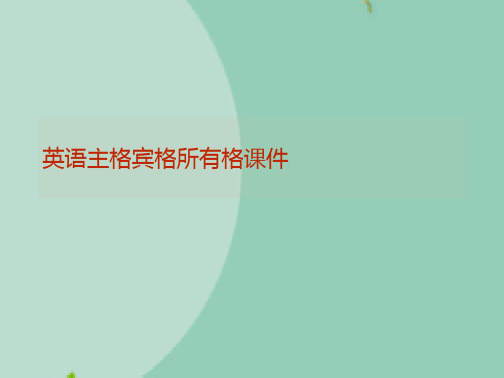
人物对话
A:Is this your book?
B:Yes,it is mine!(相当于It is my book!)
him
his
it
its
us
our
them
their
主格用做主语,例如:
I am a girl.
Are you student here?
She is a nurse. He is a doctor.
It is a dog. We are students They are apples.
人物对话
A:Is this
book?
I am a girl.
A:No, I don't.
宾格用作宾语,在动词或者介 词后:
动词后:This is me.
介词后:Go without me.
所有格相当于形容词,后 面接名词:
This is my book.
名词形式的所有格=所有格+名词
比如:my book=mine(当然, 前Байду номын сангаас要有提及,要不你说Mine别 人不知道你说的具体是什么东西)
A: I 人物对话
A:No, don't. Are you student here? ABr:De oyno'ut studbeonyt?here?
am a girl.
人所物有对 格话相当于形容词,后面接名词:
后所接有名 格词(也:称作形定容语性物主代(词汉) 语意思加的)
A:No, don't.
英语主格宾格所有格课件
主格
我(我的) 你(你的) 她(他的) 他(他的) 它(它的)
用做主语
英语中的主格宾格所有格讲解与练习
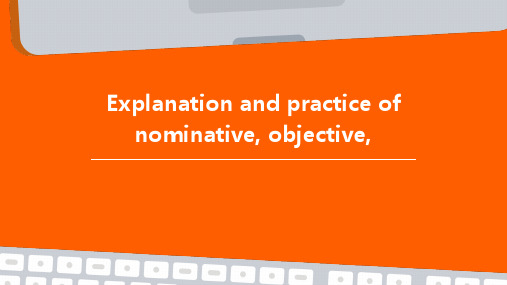
公司”,其中“管理”应作为宾语,对应英文中的宾格形式。
04
The application of nominative, objective, and possessive cases in sentences
The position and function of nominative case in a sentence
The position and function of accusative in sentences
Accusative case is used to identify the direct object of a sentence. It is the case that shows who or what receives the action.
Possessive cases show possession or ownership. They are used to show who owns something or who something belongs to.
Possessive cases are formed by adding an "-'s" or "'s" suffix to the end of a noun, for example: "John's book" (possessive case).
Irregular changes
Irregular changes refer to the non-standard or unexpected changes that occur in the ending of a verb when it is used in a particular case. In the nominative case, irregular changes often involve changing the vowel sound or adding a prefix to the verb.
04
The application of nominative, objective, and possessive cases in sentences
The position and function of nominative case in a sentence
The position and function of accusative in sentences
Accusative case is used to identify the direct object of a sentence. It is the case that shows who or what receives the action.
Possessive cases show possession or ownership. They are used to show who owns something or who something belongs to.
Possessive cases are formed by adding an "-'s" or "'s" suffix to the end of a noun, for example: "John's book" (possessive case).
Irregular changes
Irregular changes refer to the non-standard or unexpected changes that occur in the ending of a verb when it is used in a particular case. In the nominative case, irregular changes often involve changing the vowel sound or adding a prefix to the verb.
小学英语人称代词主格和宾格的用法PPT课件
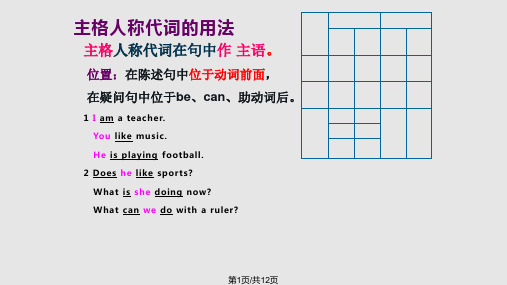
2 Listen to me, boys and girls. These apples are for them.
第2页/共12页
选择正确的代词填空
I 1 ____ (I/He) am Peter. He 2 ____ (He/ She) is a tall boy.
3 That isn’t a cat. ____ (It/ They) is a dog.
人称代词主格在句中作主语,位于动词前。
人 称 代人词称宾 格代在词句 中主作格宾 语和,宾位 于格动的词 后区(别介 词:后 ) 。
第5页/共12页
I me
him he
They them
第6页/共12页
• She favorite sport is swimming.
√ √ Her favorite sport is swimming.
• This is my book.
This is mine book.
√ • It’s name is Polly.
√ Its name is Polly.
• The skirt is her.
第7页/共12页
物主代词
第8页/共12页
物主代词
第9页/共12页
形容词性物主代词相当于形容词,用在名词前作定语。
名词性物主代词相当于名词,在句中作主语或宾语。
1 This is my book. The book is mine. mine = my book
2 That is her bike. The bike is hers. hers = her bike
第10页/共12页
her 1 -- Is this ____ watch? hers -- No, it is not ____. (she)
第2页/共12页
选择正确的代词填空
I 1 ____ (I/He) am Peter. He 2 ____ (He/ She) is a tall boy.
3 That isn’t a cat. ____ (It/ They) is a dog.
人称代词主格在句中作主语,位于动词前。
人 称 代人词称宾 格代在词句 中主作格宾 语和,宾位 于格动的词 后区(别介 词:后 ) 。
第5页/共12页
I me
him he
They them
第6页/共12页
• She favorite sport is swimming.
√ √ Her favorite sport is swimming.
• This is my book.
This is mine book.
√ • It’s name is Polly.
√ Its name is Polly.
• The skirt is her.
第7页/共12页
物主代词
第8页/共12页
物主代词
第9页/共12页
形容词性物主代词相当于形容词,用在名词前作定语。
名词性物主代词相当于名词,在句中作主语或宾语。
1 This is my book. The book is mine. mine = my book
2 That is her bike. The bike is hers. hers = her bike
第10页/共12页
her 1 -- Is this ____ watch? hers -- No, it is not ____. (she)
英语中的主格宾格所有格 讲解与练习 ppt课件

主格(人称代词)
• 在句子开头作主语,表示谁怎么样了、干什么了 • 例:1) I am a teacher. • 2) You are student. He is a student, too. • 3) We are students.
ቤተ መጻሕፍቲ ባይዱ
精品资料
• 你怎么称呼老师?
• 如果老师最后没有总结一节课的重点的难点,你 是否会认为老师的教学方法需要改进?
• 你所经历的课堂,是讲座式还是讨论式? • 教师的教鞭
• “不怕太阳晒,也不怕那风雨狂,只怕先生骂我 笨,没有学问无颜见爹娘 ……”
• “太阳当空照,花儿对我笑,小鸟说早早早……”
宾格(人称代词)
• 在动词或介词后作宾语,表示动作行为的对象。 • 例:1)Give it to me. • 2)Let’s go. (let‘s =let us) • 3)I help him dig. • 4) I love her.
所有格(物主代词)
• 用在名词前,表示是谁的东西。 • 例:1) This is my book. • 2) We love our teachers. • 3) Her mother is very kind.
LOREM IPSUM DOLOR
Practice
• 1、________(我) am a teacher. • 2、My father is talking with _______(我). • 3、_______(他) often plays basketball after school. • 4、_______(他的) teacher is good. • 5、_______(我们) buy a pair of shoes for _______(他). • 6、Please pass_____(我们) the ball. • 7、_______(他们) are listening to the radio. • 8、This is _______(我的) book. That is__________(他的)book.
主格宾格所有格反身代词(共6张PPT)
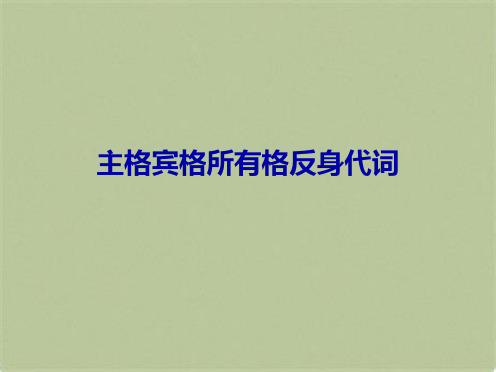
主格宾格所有格反反身代身词 代词:“....自己”
Practice
1._____am Maggie. 2._____is Lily.
3._____is Jack.
4._____are boys. 5._____are smart.
6._____are students.
7.____is a desk.
Let_____(we)sing a song together.
宾格:用在动词或介词后面 yourself,yourselves
The book is _______(I) 主格宾格所有格反身代词
形容词性所有格:“...的”,修饰后 The book is _________(Mary and Jane)
8.Lily and Lucy ______ girls.
9.This_____ a desk.
10.We_____clever.
11.They______late. 12.This is_____(I)pen.
13.Look at_____(I). 14.What’s______(you)name?
I like____(h1e)2. . She did all the work by ___________.
Look at____1_3(I.).You have the right to decide for ___________.
I think it’s ________(Bill) We asked him to tell a little about __________.
_____am M5a.ggTieh.e pens are the _________(students) Y4Couomhawveiththm6e.er.iWghet toasdekceiddehfoimr __to__t_e_l_l_a__li_t.tle about __________.
Practice
1._____am Maggie. 2._____is Lily.
3._____is Jack.
4._____are boys. 5._____are smart.
6._____are students.
7.____is a desk.
Let_____(we)sing a song together.
宾格:用在动词或介词后面 yourself,yourselves
The book is _______(I) 主格宾格所有格反身代词
形容词性所有格:“...的”,修饰后 The book is _________(Mary and Jane)
8.Lily and Lucy ______ girls.
9.This_____ a desk.
10.We_____clever.
11.They______late. 12.This is_____(I)pen.
13.Look at_____(I). 14.What’s______(you)name?
I like____(h1e)2. . She did all the work by ___________.
Look at____1_3(I.).You have the right to decide for ___________.
I think it’s ________(Bill) We asked him to tell a little about __________.
_____am M5a.ggTieh.e pens are the _________(students) Y4Couomhawveiththm6e.er.iWghet toasdekceiddehfoimr __to__t_e_l_l_a__li_t.tle about __________.
英语主格、宾格、所有格课件
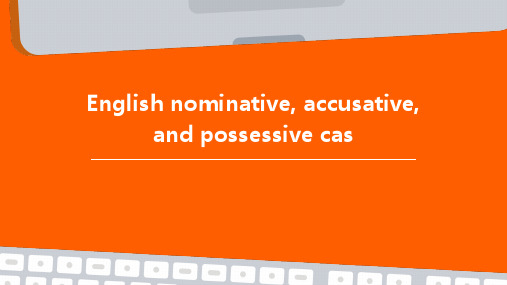
01
Subjective Case
Definition of nominative case
The nominative case is used to identify the subject of a sentence. It is the case in which the subject of a verb is expressed.
Practice with singular and plural possessives
Students practice forming possessives for singular and plural nouns, both regular and irregular, to enhance their ability to create clear and grammatically correct sentences.
With prepositions
Prepositions are used with the accusative case to show the person or thing related to the preposition. For example, "I gave the book to him" (him is the person related to the preposition "to").
Failure to use the correct case for a given grammatical function, such as using the nominative case instead of the accusative case when referring to an object.
Grammar人称代词主格宾格ppt课件

•
为什么用he?为什么不用him?
• 我的狗喜欢他。
•
My dog likes him
为什么不用he呢? 11
人称代词 it
• It 的通常用法:
• 通常:it表示人以外的动物和东西,是单数名词的代词。 译为“它”。
• 举例: •
Where is my car ? It is over there .
16
1 ( I )like watching TV。
A、I B、me
2 ( I )am a shy girl.(我)
3 ( We ) are good friends。(我们)
4 I like my math teacher,and he
also likes (us)。(我)
5. Let (us )go and help him.(我们) 17
•爱你们:
you
“你们”的主格 “你们”的宾格
You are a student . I like you.
You are students. I love you.
9
你能推出she 和 her的位置吗 ?
• she 用于主格 ,her用于宾格
• 练习:
• 她是一名护士 : S_h_e__ is a nurse.
例句
• 1. (You)are my best friend, because I like(You).(你)
• 2.( We) (我们) go to school at 8:00am every day, but (you)go to school at 7:30am every day. (你 们)
• 2. 指气候
• It is cold in Harbin 哈尔滨的气候很冷
英语中的《主格宾格和形容词性物主代词表格》课件
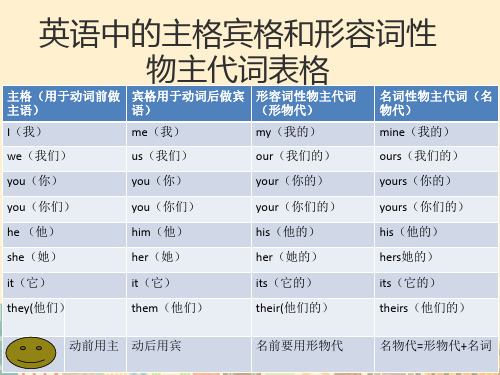
名前要用形物代
名物代=形物代+名词
例子
I help him (我帮助他。)
(主格)(动词)(宾格)
Can I help (I)?
This is my
father .
(形物代) (名词)
(I) name is Wang Hua.
The pen is hers.=The pen is her pen.
(名物代) (形物代)(名)
The book is
(your) ?
英语中的主格宾格和形容词性
物主代词表格
主格(用于动词前做 宾格用于动词后做宾 形容词性物主代词
主语)
语)
(形物代)
I(我)
me(我)
my(我的)
名词性物主代词(名 物代)
mine(我的)
we(我们)
us(我们)
our(我们的)
ours(我们的)
you(你)
you(你)
your(你的)
yours(你的)
you(你们)
you(你们)
your(你们的)
yours(你们的)
he (他)
him(他)
his(他的)
his(他的)
she(她)
her(她)
her(她的)
hers她的)
it(它)
it(它)
Hale Waihona Puke its(它的)its(它的)
they(他们)
them(他们)
their(他们的)
theirs(他们的)
动前用主 动后用宾
- 1、下载文档前请自行甄别文档内容的完整性,平台不提供额外的编辑、内容补充、找答案等附加服务。
- 2、"仅部分预览"的文档,不可在线预览部分如存在完整性等问题,可反馈申请退款(可完整预览的文档不适用该条件!)。
- 3、如文档侵犯您的权益,请联系客服反馈,我们会尽快为您处理(人工客服工作时间:9:00-18:30)。
2021
3
所有格(物主代词)
• 用在名词前,表示是谁的东西。 • 例:1) This is my book. • 2) We love our teachers. • 3) Her mother is very kind.
2021
4
LOREM IPSUM DOLOR
2021
5
Practice
• 1、________(我) am a teacher. • 2、My father is talking with _______(我). • 3、_______(他) often plays basketball after school. • 4、_______(他的) teacher is good. • 5、_______(我们) buy a pair of shoes for _______(他). • 6、Please pass_____(我们) the ball. • 7、_______(他们) are listening to the radio. • 8、This is _______(我的) book. That is__________(他的)book.
2021
7
2021
1
主格:1) I am a teacher. • 2) You are student. He is a student, too. • 3) We are students.
2021
2
宾格(人称代词)
• 在动词或介词后作宾语,表示动作行为的对象。 • 例:1)Give it to me. • 2)Let’s go. (let‘s =let us) • 3)I help him dig. • 4) I love her.
2021
6
Practice
• 9、_______(他的) chair is blue. _____________( 我们的) is yellow. • 10、_______(我们的) classroom is big._________( 你们的)
classroom is small. • 11、_______(他) often plays basketball after school. • 12、_______(他的) teacher is good. _____(她的) teacher is good too. • 13、My book is blue. _________(you) book is red. • 14、Our chair is better than _________ ( they)chairs. • 15、I will give the presents to________(they).
